- Home
- Michael Connelly
Angle of Investigation: Three Harry Bosch Stories
Angle of Investigation: Three Harry Bosch Stories Read online
Angle of Investigation: Three Harry Bosch Stories
Michael Connelly
Three Harry Bosch Short Stories
In CHRISTMAS EVEN, the case of a burglar killed in mid-heist leads Bosch to retrace a link to his past.
In FATHER'S DAY, Bosch investigates a young boy's seemingly accidental death and confronts his own fears as a father.
In ANGLE OF INVESTIGATION, Bosch delves into one of the first homicides he ever worked back as a uniformed rookie patrolman, a case that was left unsolved for decades.
Together, these gripping stories span Bosch's controversial career at the LAPD and show the evolution of the haunted, legendary investigator he would become.
Michael Connelly
Angle of Investigation: Three Harry Bosch Stories
© 2011
Christmas Even
The Three Kings Pawnshop on Hollywood Boulevard had been victimized by a burglar three times in two years. The criminal methods of each break-in were similar and so it was suspected by the Los Angeles Police Department that the same thief was responsible each time. But the thief was careful never to leave a fingerprint or any other clue to his identity. No arrests were ever made and none of the stolen property was ever recovered. Nikolai Servan, the Russian immigrant who owned the store, was left to wonder about the justice system of his adopted country.
On the day before Christmas of this year Servan unlocked the rear door of the pawnshop, entered and discovered that his business had been victimized a fourth time. He also discovered that the burglar was still inside. It was this discovery that ultimately brought Detective Harry Bosch and his partner, Jerry Edgar, to the Three Kings Pawnshop.
Shortly after 10 A.M. they arrived in a slickback Bosch had checked out of the motor pool at the Hollywood Division. They knew a burglary detective named Eugene Braxton was already waiting inside the shop with Nikolai Servan. Along with the body.
“Look at that, Harry, looks like a big old Christmas present,” Edgar remarked as Bosch killed the engine. “Just waitin’ for us to open it.”
Edgar was right. The exterior walls of the small, single-story pawnshop were painted a garish red. The yellow crime scene tape that had been strung across the front by the patrol officers looked like a bow. Bosch didn’t bother to comment on his partner’s observation. He got out and closed the car door.
Bosch stood for a moment on the sidewalk and studied the front of the pawnshop. It was between a porno emporium and a shop that offered private mailboxes. A steel security gate had been folded open-presumably by Servan that morning after he called the police. Bosch looked up at the sign on the front wall above the plateglass windows. He saw that the triangular formation of three balls-the international pawnshop emblem-had been modified to include a king’s crown on each ball.
“Cute,” Edgar said, looking up at the sign, too.
“Very,” Bosch said. “Let’s get this done.”
“Don’t worry about me, Har. I’m not going to hold things up. It’s Christmas Eve. I wanna wrap this thing up and get home early for a change.”
Bosch stepped in and moved through the front of the shop, past the bicycles and golfe="ize clubs and antiques and musical instruments, and reached the counter where Braxton and Servan waited.
Braxton, who had investigated the previous three burglaries at Three Kings, had gotten there first because Servan had his business card taped to the side of the telephone. When the shop owner came to work that morning and found the dead burglar behind the jewelry case, he didn’t dial 911. He dialed Braxton.
“Merry Christmas, Brax,” Bosch said. “What have we got?”
“Deck the halls, Harry,” Braxton said. “We’ve got one less burglar in the world. And that makes Christmas a good one for me already.”
Bosch nodded and looked at Servan, who was seated on a tall stool on the other side of the counter. He was about fifty with black hair thinning on the top. He had a lot of muscle that was going soft. He had no visible tattoos.
“This is Nikolai Servan,” Braxton said. “This is his store.”
Bosch reached a hand across the counter to shake Servan’s hand. The Russian came off the stool and shook hands firmly.
“Mr. Servan, I’m Detective Bosch. This is Detective Edgar.”
“Nick. Call me Nick, please.”
His accent was heavy. Bosch guessed he’d been in the country only a few years. Edgar reached across the counter and shook his hand as well.
Bosch moved around Braxton and over to the area behind the glass jewelry counter. Sprawled on the floor in this close space was the body. He was a white man dressed head to toe in black. All except for the right hand. It was not wearing a glove, while the left hand was. Bosch crouched like a baseball catcher next to the body and studied it without touching anything. A knit ski mask had been pulled down over the face. There were openings for the eyes and mouth. Bosch noted that the eyes were open and the lips were pulled back despite the teeth being closed together tightly. He spoke without looking up.
“What’s the ETA on ME and SID?”
“On the way,” Braxton said. “That’s all I can tell you. Not much traffic today, though.”
The medical examiner’s team and the forensics people would be coming from downtown. Bosch and Edgar had driven only eight blocks from the station where they were posted.
“You know this guy, Brax?”
“Can’t see enough of him to know for sure.”
Bosch didn’t say anything. He waited. He knew that Braxton had to have taken a quick look under the ski mask, even though this would have violated crime scene protocol.
“It kind of looks like a guy I popped about five years back nath=ears bamed Monty Kelman,” Braxton said.
Bosch nodded.
“Local guy, I take it?”
“Most of the time. From what I heard, he used to take out-of-town assignments. Was on a crew that took work from a setup guy named Leo Freeling. Worked out of the Valley. But Leo got himself killed a few years back. I think Monty’s been sort of setting up his own capers since then.”
“Works alone?”
“Depends on the job.”
Bosch took a pair of latex gloves out of his pocket, blew them up like balloons to make them fit better and then slipped them on. He adjusted his position and tried to roll the body a little bit to check for wounds and the missing glove. He didn’t see anything but he didn’t want to roll the body completely over until after photos were taken and the medical examiner’s investigators surveyed the scene.
“So how did this guy die?”
The question was rhetorical but he looked up at Servan just as he said it. It seemed to take the shop owner by surprise, as if he had been accused of something. Servan spread his hands and shook his head.
“I don’t know this,” he said. “I come to shop, unlock, he is dead right there.”
Bosch nodded and looked around the counter area. He noticed Edgar was no longer there. He looked at Braxton.
“Brax, why don’t you take Mr. Servan to one of the patrol cars so we can work in here.”
While Braxton took Servan outside, Bosch went back to the body and continued his examination. He lifted the bare hand and studied it, trying to figure out why there was no glove. He noticed a discoloration on the pad of the thumb. A brownish yellow line. There was a matching line of discoloration on the index finger. Using both hands he placed the thumb and finger together, aligning the two marks. It appeared as though the hand-the right hand-had been holding a pen or some other thin instrument when the marks had been made.
Bosch carefully placed the hand on the flo
or and moved down the body to the feet. He removed the right shoe, a black leather athletic shoe with a black rubber sole, and peeled off the black sock. On the ball of the dead man’s foot was a circular discoloration that was brown at its center, tapering outward in yellow.
“Whadaya got, Harry?”
Bosch looked up. It was Braxton.
“I’m not sure yet. You see a glove? The guy’s missing a glove.”
“Over here.”
It was Edgar. He was behind another display case on the other side ofustther si the shop. Bosch stood up and walked over. Edgar crouched and pointed beneath the case.
“There’s a black leather glove under the case. I don’t know if it’s a match but it is a glove.”
Bosch got down on his hands and knees so he could look underneath the display case. He reached under and pulled out the glove.
“Looks the same,” he said.
“If it does not fit, you must acquit,” said Edgar.
Bosch looked at him.
“Johnnie Cochran,” Edgar said. “You know, the O.J. gloves.”
“Right.”
Bosch stood up. One of his knees made a popping sound as he did so. He looked into the case. It contained two shelves lighted from inside. On the shelves were non-jewelry items of what appeared to be high value. There were coins and some small jade sculptures, gold and silver pillboxes, cigarette cases and other ornate and bejeweled trinkets. It was high-end stuff. Most of the coins, Bosch noticed, were Russian.
Bosch stepped away from the case and surveyed the shop. Other than the two display cases there was mostly junk, the property of financially desperate people willing to part with almost anything in exchange for cash.
“Brax,” Bosch said. “Where’s the entry?”
Braxton signaled him toward the back and led the way. Bosch and Edgar followed. They came to a rear room that was used as an office and for storage. Gravel and other debris were scattered on the floor. They all looked up. There was a hole roughly cut in the ceiling. It was two feet wide and there was blue sky above.
“It’s a composite roof,” Braxton said. “No big thing cutting through. A half hour maybe.”
“It would make noise,” Edgar said. “Anybody know when the porno palace closes?”
“I remember I checked one of the other times this place was hit,” Braxton said. “He closes at four, reopens at eight. Four-hour window.”
“The roof the entry point in the other three hits?” Bosch asked.
Braxton shook his head.
“He hit the back door the first two times and then the roof. This is the second time through the roof.”
“You think it was Monty all three times before?”
“Wouldn’t doubt it. That’s what these guys do. Hit the same places over and over. After the second time the back door was used, Mr. Servan took precautions there. Added more steel reinforcement. So the guy went up onto the rook ionto thf.”
“Why this place so many times?” Edgar asked.
“A lot of immigrants come here. Russians, Koreans, from all over. They pawn the stuff they brought with them from the homeland. Jade. Gold. Coins. Small, expensive stuff. Burglars love that shit, man. That case where you found that glove? It’s all in there. That’s what the guy came in for. I don’t know why he ended up behind the jewelry case.”
“What’s been the take on the prior three?” Bosch asked.
“It’s probably averaged out to forty to fifty grand a hit,” Braxton said. “That’s on the high side for a pawnshop. That’s why this guy kept getting hit.”
A patrolman stepped back into the rear room and told the detectives that the medical examiner’s people had arrived.
The three detectives continued to huddle for a moment to discuss initial impressions and Bosch’s theory on what had happened to the burglar and to set a case strategy. It was decided that Edgar would stay on scene and assist the ME and SID teams as necessary. Bosch and Braxton would handle Servan and next-of-kin notification.
As soon as the medical examiner’s investigator rolled a set of prints off the burglar’s exposed hand, Bosch and Braxton headed back to Hollywood Division along with Nikolai Servan.
Bosch scanned the prints into the computer and sent them downtown to the print lab at Parker Center. He then conducted a formal and taped interview with Servan. Though the pawnbroker added nothing new to what he had told them in his shop, it was important for Bosch to lock down his story on tape.
By the time he was done with the interview he had a message waiting from a print technician named Tom Rusch. The prints were matched by computer to a thirty-nine-year-old ex-convict named Montgomery George Kelman. Kelman was on parole for a burglary conviction.
It took Bosch three calls to locate Kelman’s parole agent and to get the dead man’s current address and employer. He was told Kelman worked a morning dishwashing shift at a restaurant on Hillview. The parole agent had already received a call that morning from the restaurant owner, who reported that Kelman had not shown up for work or called in sick-as parole regulations dictated. The agent seemed pleased to learn he didn’t have to bother filing all the paperwork needed to show Kelman violated parole.
“Merry Christmas!” he said to Bosch before hanging up.
After checking with Edgar by phone and learning the techs were still working the body and scene, Bosch told his partner that the victim had been IDed as Kelman and that he and Braxton were headed to the address the parole agent had provided for Kelman. He said they were going to leave Nikolai Servan behind in an interview room at the division.
Monty Kelman’s address was an apartment on Los Feliz near Griffith Park. Bosch’s knock was answered by a young woman in shorts andresn short a long-sleeve turtleneck shirt. She was thin to the point of being gaunt. An obvious junkie. She abruptly collapsed into the fetal position on the couch when they gave her the bad news about Monty. While Braxton attempted to console her and gather information from her at the same time, Bosch took a quick look around the one-bedroom apartment. As he expected, there was no obvious sign that the premises belonged to a burglar. This apartment was the front-the place where the parole agent visited and Kelman kept the semblance of a law-abiding life. Bosch knew that any active burglar with a parole tail would keep a separate and secret place-a safe house-for his tools and swag.
In the bedroom was a small desk in which Kelman kept his checkbook and personal papers. Bosch flipped through the checkbook and saw nothing unusual. He looked through everything else in the drawer but found no lead to Kelman’s safe house. He wasn’t particularly anxious about it. It was just a loose end, something that would be of greater concern to Braxton, as a burglary detective, than to Bosch.
As he turned to leave the bedroom he saw a saxophone propped on a stand in the corner by the door. He recognized from its size that it was an alto. He stepped over and lifted it into his hands. It looked old but well cared for. It was polished brass and he saw the buffing cloth pushed down into the mouth of the instrument. Bosch had never played the saxophone, had never even tried, but the instrument’s sound was the only music that had ever been able to truly light him up inside.
He held the instrument with a sense of reverence he rarely exhibited for any person or thing. And for a moment he was tempted to raise the mouthpiece to his lips and try to sound a note. Instead, he gripped the instrument the way he had seen countless musicians-from Art Pepper to Wayne Shorter-hold theirs.
“Harry, you got anything?” Braxton said from the other room.
Bosch carried the saxophone and stand out to the living room. The woman was sitting up on the couch now, her arms folded tightly across her chest. Tears streaked her face. Bosch didn’t know if she was crying over her lost love or her lost junk ticket.
He held up the saxophone.
“Whose is this?”
She swallowed before answering.
“It’s Monty’s. Was.”
“He played?”
“He tried. He liked ja
zz. He always said he wanted to take lessons. He never did.”
A new rush of tears cascaded down her cheeks.
“It’s gotta be swag,” Braxton said, ignoring her and speaking to Bosch. “I can run it on the box when we get back. On those things the manufacturer and serial number are engraved inside the bell.”
He pointed to the mouth of the horn.
“In there. Wouldn’t surprise me if it came out of Servan’s shop on one of the earlier B and Es.”
Bosch pulled the felt buffing cloth out of the opening and looked inside. There was an inscription on the curved brass but he couldn’t read it. He walked over to the window and angled the instrument so sunlight flooded into the mouth. He bent close and turned the instrument so he could read it.
CALUMET INSTRUMENTS
CHICAGO, ILLINOIS
CUSTOM MADE FOR QUENTIN MCKINZIE, 1963
“THE SWEET SPOT”
Bosch read it again and then a third time. His temples suddenly felt as if someone had pressed hot quarters against them. A flash memory filled his thoughts. A musician under the canopy set up on the deck of the ship. The soldiers crowded close. Those in wheelchairs, the men missing limbs, at the front. The man playing the sax, bending up and down and in and out like Sugar Ray Robinson coming from the corner of the ring. The music beautiful and agile, lighting him up. The sound better than anything he had ever heard. The goddamn light at the end of all his tunnels.
“Jesus, Harry, what’s it say?”
Bosch looked over at Braxton, the memory retreating into the darkness.
“What?”
“You look like you saw a ghost hidin’ in there. What’s it say?”
“Chicago. It was made in Chicago.”
“Calumet?”
“How’d you know?”
“I’m a burglary detective. It’s my job to know. Calumet is one of the big ones. Been around a long time. We might be able to trace it.”
Bosch nodded.

 Blue on Black
Blue on Black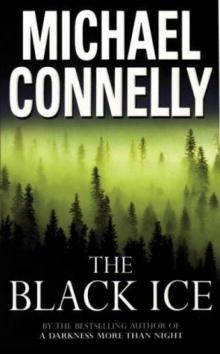 The Black Ice (1993)
The Black Ice (1993) Crime Beat: A Decade of Covering Cops and Killers
Crime Beat: A Decade of Covering Cops and Killers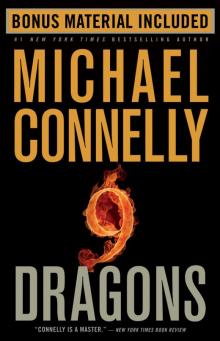 Nine Dragons
Nine Dragons The Late Show
The Late Show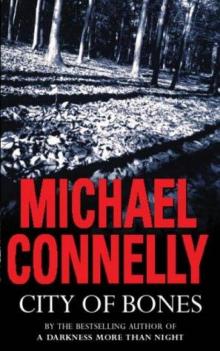 City of Bones
City of Bones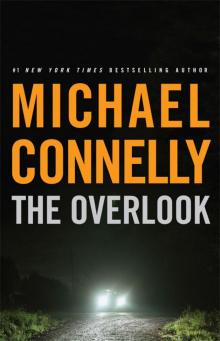 The Overlook
The Overlook The Crossing
The Crossing The Poet (1995)
The Poet (1995) Murder Worthy
Murder Worthy The Wrong Side of Goodbye
The Wrong Side of Goodbye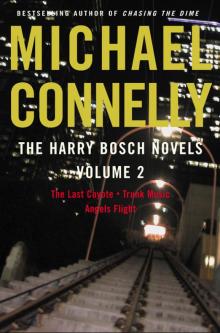 Harry Bosch Novels, The: Volume 2
Harry Bosch Novels, The: Volume 2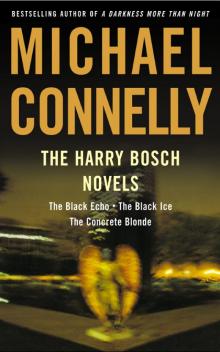 The Harry Bosch Novels
The Harry Bosch Novels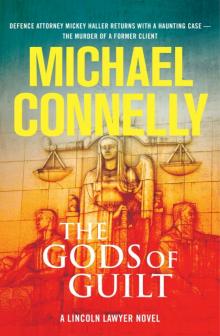 The Gods of Guilt
The Gods of Guilt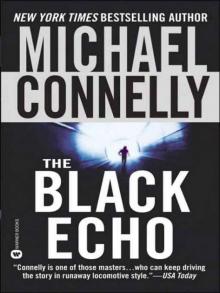 The Black Echo
The Black Echo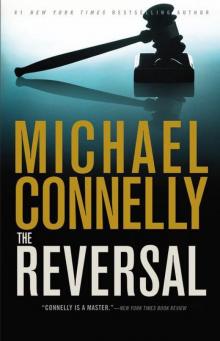 The Reversal
The Reversal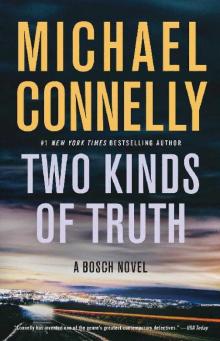 Two Kinds of Truth
Two Kinds of Truth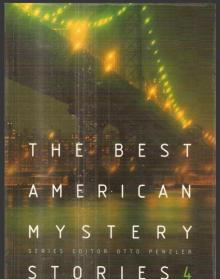 The Best American Mystery Stories 2003
The Best American Mystery Stories 2003 The Rag
The Rag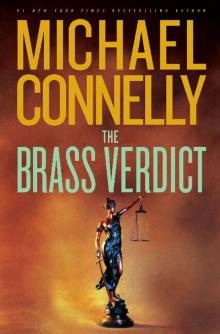 The Brass Verdict
The Brass Verdict The Black Echo (1992)
The Black Echo (1992)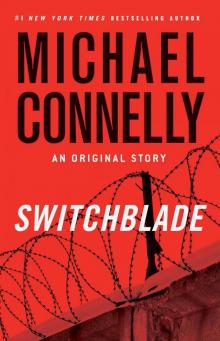 Switchblade
Switchblade The Last Coyote
The Last Coyote The Narrows
The Narrows The Concrete Blonde (1994)
The Concrete Blonde (1994)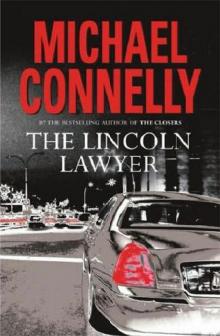 THE LINCOLN LAWYER (2005)
THE LINCOLN LAWYER (2005)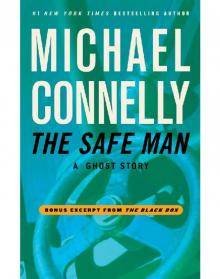 The Safe Man: A Ghost Story
The Safe Man: A Ghost Story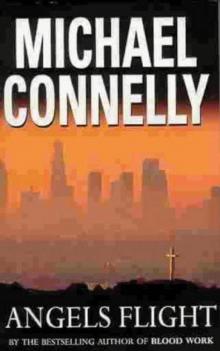 Angels Flight (1998)
Angels Flight (1998) Void Moon
Void Moon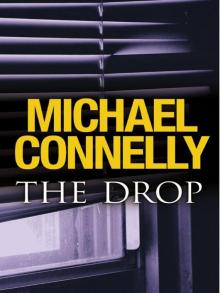 The Drop
The Drop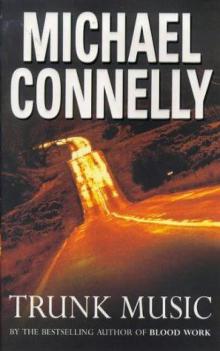 Trunk Music
Trunk Music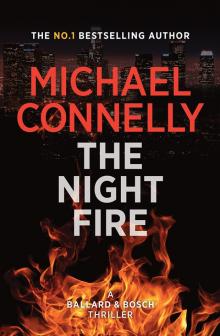 The Night Fire
The Night Fire The Black Ice
The Black Ice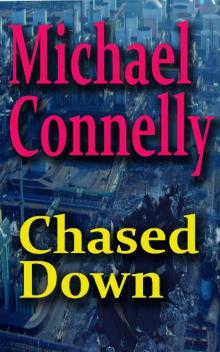 Chased Down
Chased Down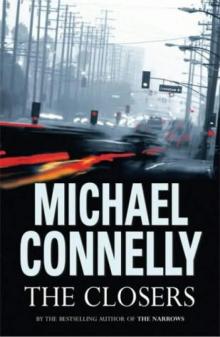 The Closers
The Closers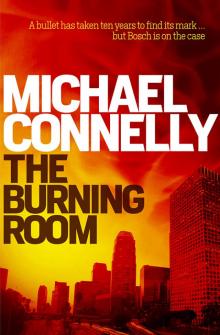 The Burning Room
The Burning Room Angels Flight
Angels Flight SSC (2012) Mulholland Drive
SSC (2012) Mulholland Drive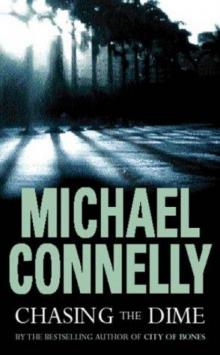 Chasing the Dime
Chasing the Dime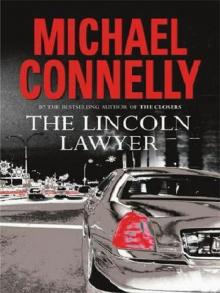 The Lincoln Lawyer
The Lincoln Lawyer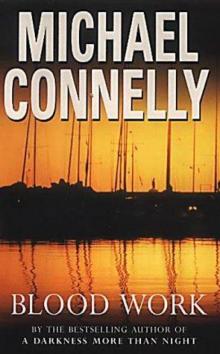 Blood Work (1998)
Blood Work (1998) Echo Park
Echo Park A Darkness More Than Night
A Darkness More Than Night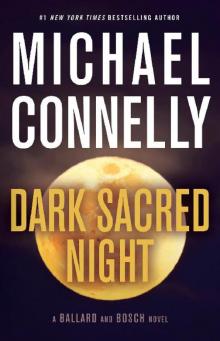 Dark Sacred Night - Ballard and Bosch #1;Renée Ballard #2
Dark Sacred Night - Ballard and Bosch #1;Renée Ballard #2 Lost Light
Lost Light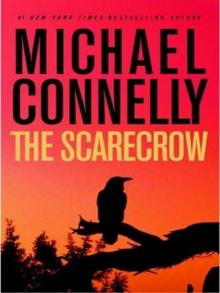 The Scarecrow
The Scarecrow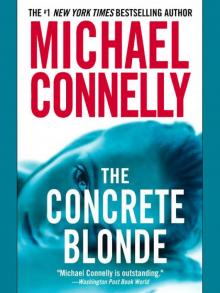 The Concrete Blonde
The Concrete Blonde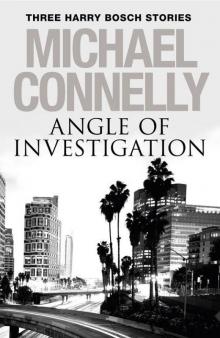 Angle of Investigation
Angle of Investigation Suicide Run: Three Harry Bosch Stories
Suicide Run: Three Harry Bosch Stories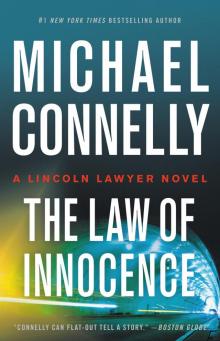 The Law of Innocence
The Law of Innocence Murder in Vegas: New Crime Tales of Gambling and Desperation
Murder in Vegas: New Crime Tales of Gambling and Desperation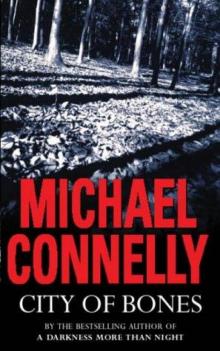 City Of Bones (2002)
City Of Bones (2002)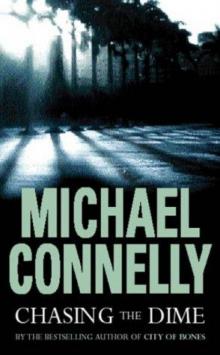 Chasing the Dime (2002)
Chasing the Dime (2002)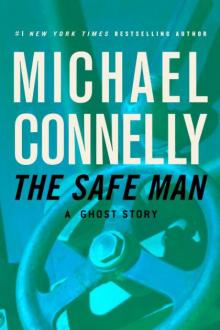 The Safe Man
The Safe Man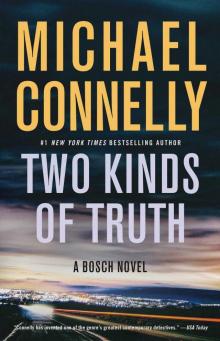 Two Kinds of Truth (A Harry Bosch Novel)
Two Kinds of Truth (A Harry Bosch Novel)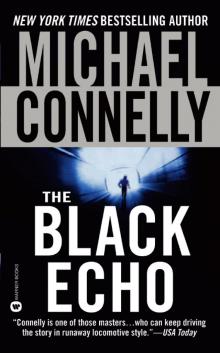 Harry Bosch 01 - The Black Echo
Harry Bosch 01 - The Black Echo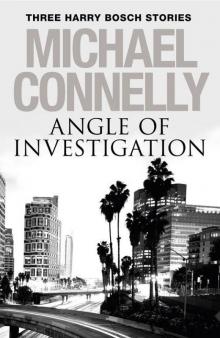 Angle of Investigation: Three Harry Bosch Short Stories
Angle of Investigation: Three Harry Bosch Short Stories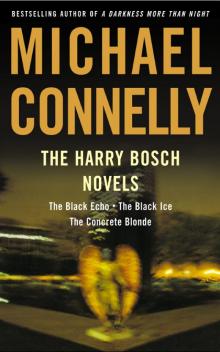 The Harry Bosch Novels Box Set 1
The Harry Bosch Novels Box Set 1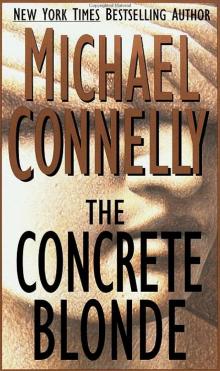 The Concrete Blonde hb-3
The Concrete Blonde hb-3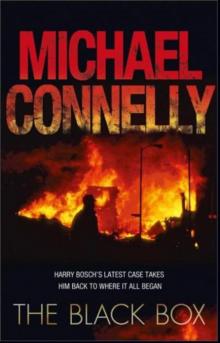 The Black Box hb-18
The Black Box hb-18 Short Stories
Short Stories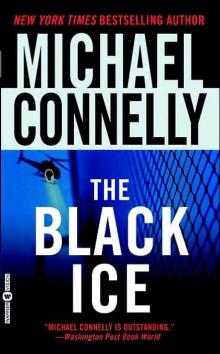 The Black Ice hb-2
The Black Ice hb-2 The Last Coyote (1995)
The Last Coyote (1995) The Gods of Guilt mh-5
The Gods of Guilt mh-5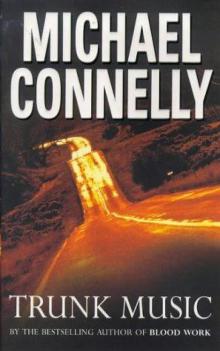 Trunk Music (1996)
Trunk Music (1996) Harry Bosch 02 - The Black Ice
Harry Bosch 02 - The Black Ice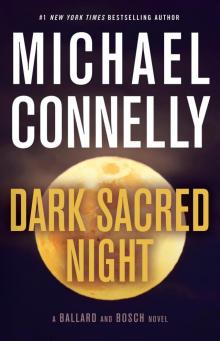 Dark Sacred Night
Dark Sacred Night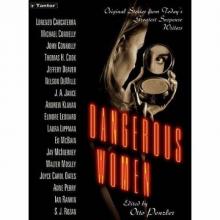 Cielo Azul
Cielo Azul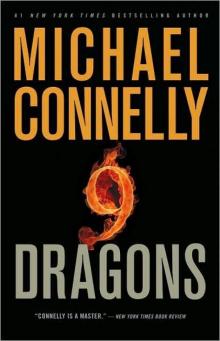 9 Dragons
9 Dragons The Narrows (2004)
The Narrows (2004) The Wrong Side of Goodbye (Harry Bosch Series)
The Wrong Side of Goodbye (Harry Bosch Series) In The Shadow Of The Master: Classic Tales by Edgar Allan Poe
In The Shadow Of The Master: Classic Tales by Edgar Allan Poe Void Moon (1999)
Void Moon (1999)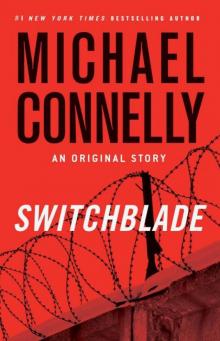 Switchblade: An Original Story (harry bosch)
Switchblade: An Original Story (harry bosch)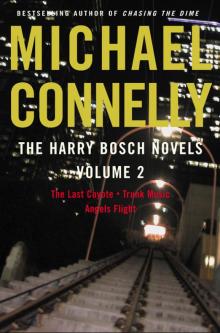 The Harry Bosch Novels, Volume 2
The Harry Bosch Novels, Volume 2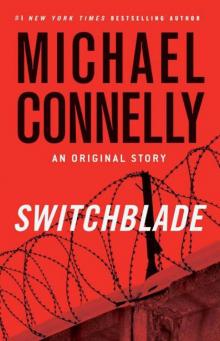 Switchblade: An Original Story
Switchblade: An Original Story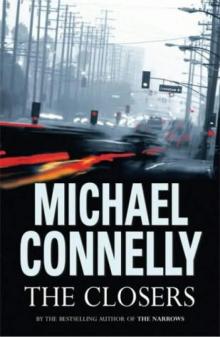 The Closers (2005)
The Closers (2005) Crime Beat
Crime Beat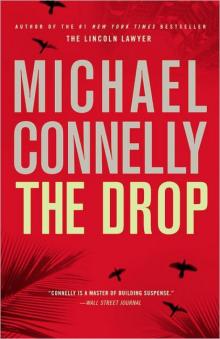 The Drop hb-17
The Drop hb-17 The Gods of Guilt (Mickey Haller 5)
The Gods of Guilt (Mickey Haller 5) Mulholland Dive: Three Stories
Mulholland Dive: Three Stories Lost Light (2003)
Lost Light (2003)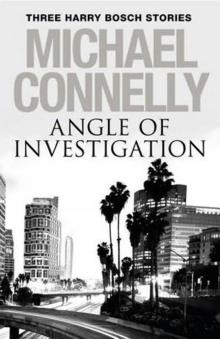 Angle of Investigation: Three Harry Bosch Stories
Angle of Investigation: Three Harry Bosch Stories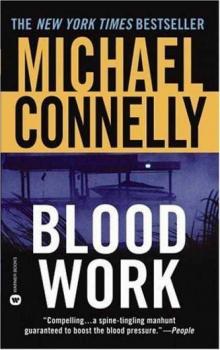 Blood Work
Blood Work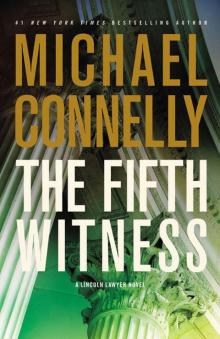 The Fifth Witness: A Novel
The Fifth Witness: A Novel A Darkness More Than Night (2000)
A Darkness More Than Night (2000)